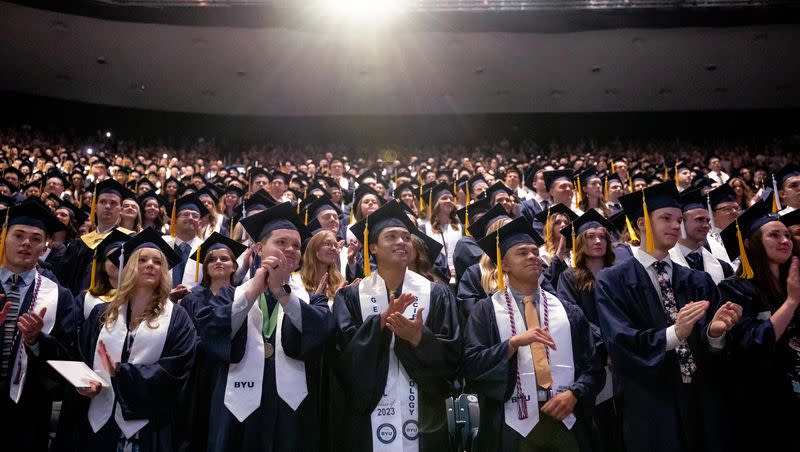Latter-day Saints have significantly fewer student loans, according to national survey

New national data from the Cooperative Election Study indicates that, on average, 38% of people between the ages of 20-40 with at least some college education report having student loan obligations.
Religious groups in the sample largely mirror the national average, and the difference between, say, Catholics and Protestants is negligible.
Latter-day Saints, however, report measurably lower student loans — with only 26% of Latter-day Saints between the ages of 20-40 with at least some college indicating that they have student loan obligations.

Student loans have become yet another politicized hot topic ever since President Joe Biden proposed in the summer of 2022 a cancellation of up to 400 billions in student loans. After a Supreme Court majority declared his plan unconstitutional a year later, the White House revived a smaller proposal to allay $39 billion in student debt.
Although some of these methods for loan forgiveness have provoked a range of concerns, the impetus for Biden’s move is understandable. After all, the weight of student debt is significant, with 44 million Americans owing a combined $1.7 trillion for their education, according to the Annie E. Casey Foundation, representing the second greatest debt burden for Americans after home mortgages.
How best to alleviate this considerable burden is a question of national significance, which makes these measurable differences in how Latter-day Saints are faring of special interest.
This latest finding is in line with the fact that Utah offers more affordable higher education than most other states. And women in Utah are also more likely than the average woman in the U.S. to have a bachelor’s degree, according to U.S. Census Bureau data.
Other religious minorities likewise seem to be faring well in the area of student loans, including Hindu, Eastern Orthodox and Jewish communities. Although we can’t be sure about all the reasons, there is a good chance that some of this is attributable to an emphasis on affordable education among certain minority faiths and ongoing efforts by faith communities to make education accessible.
The Board of Trustees of Brigham Young University and the Church Educational System for The Church of Jesus Christ of Latter-day Saints have made it a signature emphasis to make higher education more affordable, and therefore accessible, all around the world. For decades now, the education at Brigham Young University has been heavily subsidized as a way to reduce student debt, leading BYU to be consistently ranked as one of the best value colleges in the nation.
The subsidy comes from tithing funds donated by members of The Church of Jesus Christ of Latter-day Saints. More than subsidizing alone, however, the church has proactively taken steps to be an innovator in the higher education space. These include the BYU-Idaho three semester calendar year, a focus on undergraduate teaching and a three-year degree offered by BYU-Idaho and BYU-Pathway, recently approved for accreditation reducing the time-to-degree by removing certain elective requirements.
Through its BYU-Pathway program the church is also sponsoring innovative efforts to make affordable education all around the world more of a possibility — including in areas of Asia, Africa and South America. While universities in the United States often charge less for students who can demonstrate need, BYU-Pathway scales this concept internationally; for example, charging only $5 a credit in Zimbabwe.
The savings from these innovations goes to lowering the cost for students, rather than subsidizing more expensive programs, as sometimes occurs at other universities. While access to education is clearly important, the motivation is spiritual.
As Elder Clark G. Gilbert, Commissioner of Church Education and a member of the Quorum of the Seventy for the church, has reiterated it’s “religious mission that drives the innovation imperative,” suggesting that a heavy loan burden can be a factor in delaying family formation (marriage and children) — a key tenet of the faith. Keeping loans down is a way of making it easier for graduates to marry, start families, own a home and build a life.
Latter-day Saints, of course, aren’t the only ones actively working to reduce educational costs at scale. The United Negro College Fund, for example, has assisted nearly half a million students. There is also a renewed interest in trade schools and other lower-cost, more applied education options for people wanting to avoid large amounts of onerous educational debt.
At Berea College, every student works a minimum of 10 hours per week on campus as a part of eliminating tuition costs — reflecting a larger consortium of 10 federally recognized “work colleges” each seeking to reduce the cost of education by “promoting the purposeful integration of Work-Learning-Service.” One of the smallest institutions of higher education in the country, Deep Springs College, similarly provides room, board and tuition to the small group of students who — alongside their studies — contribute manual labor on the secluded cattle ranch where the college is located.
Whatever the creative future of higher education and credentialism holds, the finding that Latter-day Saints are much less likely to have student debt suggests that current efforts at Brigham Young University and BYU-Pathway are making a measurable difference, and have the potential to make a broader difference for other universities looking for innovative ways to reduce the burden of student debt.
Stephen Cranney is a nonresident fellow at Baylor University’s Institute for the Studies of Religion and teaches at The Catholic University of America.